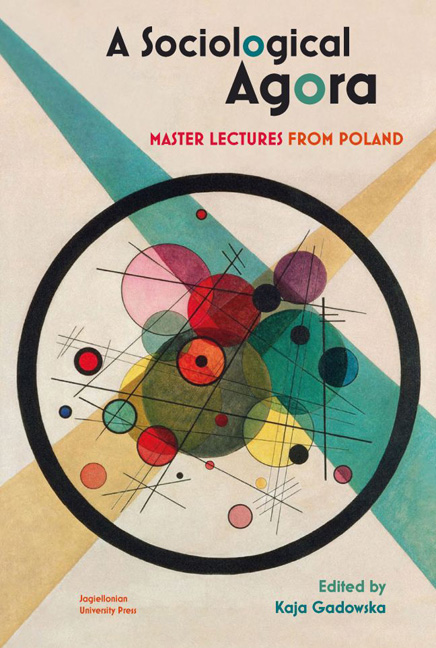Book contents
- Frontmatter
- Contents
- Society in a Time of Pandemia: Postmodern Problems from a Social and Humanistic Perspective
- Trust and Risk in the Time of Pandemia
- The Mythologized Populist Imagination, Carnival Rebellion, and the Fate of Liberal Democracy
- Applied Feminism: Women’s Rebellion and Identity
- On Law and its Interpretative Artifacts
- On Legal Nihilism Once More: Lessons from Poland
- Minima iuridica: Reflections on certain legal (un)obviousnesses
- Community—Meaning What?
- An Essay on Welfare: Problematic and Debatable Issues
- Sources of an Ecclesiastical System Success
- About the Authors
- About the Editor
- About the Translator
- Polish Sociological Association
Community—Meaning What?
Published online by Cambridge University Press: 01 March 2024
- Frontmatter
- Contents
- Society in a Time of Pandemia: Postmodern Problems from a Social and Humanistic Perspective
- Trust and Risk in the Time of Pandemia
- The Mythologized Populist Imagination, Carnival Rebellion, and the Fate of Liberal Democracy
- Applied Feminism: Women’s Rebellion and Identity
- On Law and its Interpretative Artifacts
- On Legal Nihilism Once More: Lessons from Poland
- Minima iuridica: Reflections on certain legal (un)obviousnesses
- Community—Meaning What?
- An Essay on Welfare: Problematic and Debatable Issues
- Sources of an Ecclesiastical System Success
- About the Authors
- About the Editor
- About the Translator
- Polish Sociological Association
Summary
I am aware of the fact that the issue of community has already been addressed by the greatest philosophers, followed by many a historian of philosophy. Holding a special place in my heart is Bronisław Baczko's book (which I witnessed in the making) on Jean-Jacques Rousseau. Coming also to mind is a statement by Leszek Kołakowski (recently recalled by Zbigniew Mentzel) that a thread linked to the thinking of the classic philosophers should be preserved in order to draw impetuses for one's own reflections. Kołakowski—as Mentzel underscores—valued philosophical wisdom more than “observational intelligence.” After a few decades of working as a historian, I will allow myself a somewhat different approach. Perusing pieces known well to me, I will pose questions regarding the social phenomenon of interpersonal communities. After all, history is a grand experiment in the field of social studies—even if without clearly formulated postulates, without controlled variables, and, unfortunately, most frequently without the consent of the subject-participants (not to mention the approval of an ethics committee).
The word “community” is applied very often. Generally speaking, it carries a positive tone. Although we know that something like, for instance, a “community in crime” or a “mafia community” exists, we most often speak of a “familial” or “intellectual” or “national” community. At the same time, this phenomenon is very difficult to define—which is not a rarity in the social sciences and humanities (may this trivial distinction remain which divides precisely our community).
Participation in a community need not be conscious and a community's symbolic dimension need not coincide with reality. One can be symbolically against an individual, yet remain with that person within a community. After all, those whom we like are sometimes those with whom we bicker. One can belong to a community for some reason (e.g., due to certain traits never willfully chosen), yet hold it at a distance for other reasons. It is possible—for a single individual or a smaller or larger group—to not want to be in a given community, but be deprived of a way out of it. It is not uncommon to hold mutual grudges within a family, but still remain one after all.
- Type
- Chapter
- Information
- A Sociological AgoraMaster Lectures from Poland, pp. 147 - 166Publisher: Jagiellonian University PressPrint publication year: 2023



